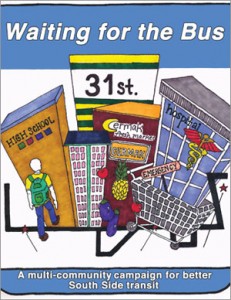Transit Victory
 Generally, neighborhoods with issues with accessibility and public transportation tend to be low-income communities of color. Yet, these low-income minority communities tend to be the most transit dependent areas. By framing the issue of lack of public transportation as social justice, LVEJO is able to critically analyze and combat the injustices through mobilization and community action. Over the past 12 years, LVEJO worked furiously on bringing effective public transportation to the community of Little Village.
Generally, neighborhoods with issues with accessibility and public transportation tend to be low-income communities of color. Yet, these low-income minority communities tend to be the most transit dependent areas. By framing the issue of lack of public transportation as social justice, LVEJO is able to critically analyze and combat the injustices through mobilization and community action. Over the past 12 years, LVEJO worked furiously on bringing effective public transportation to the community of Little Village.
The impacts of an efficient public transportation system are felt well beyond the urban landscape. A well planned public transportation system serves as an effective way to combat automobile dependency. An efficient public transportation system promotes sustainable high-density mixed-use development and serves as a way to combat urban sprawl. Urban sprawl is responsible for the eradication of natural landscapes, the decline of quality of living conditions and requires the unsustainable patterns of waste production and resource consumption. An effective transportation system also calls for smarter and practical policies from elected officials and can lower a city’s ecological footprint.
LVEJO’s most notable transit victory involves the 31st bus route. Through working closely with the community and partnering with Illinois State Senator Martin Sandoval, LEVJO was able to hold the Chicago Transit Authority accountable and demand an experimental bus trial. By having an extension of the 35st bus route service the 31st business corridor, LVEJO was able to hold CTA accountable and provide the much need service to the Little Village residents. After LEVJO was able to prove the need for the service, the 31st bus route became a permanent route in 2012, available to all Little Village residents.
